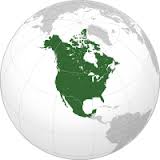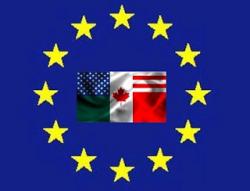NAFTA and the Future of Canada, Mexico and the United States
The 20th anniversary of NAFTA’s implementation on Jan. 1 has revived some of the perennial arguments that have surrounded the bloc since its inception. The general consensus has been that the trade deal was a mixed bag, a generally positive yet disappointing economic experiment.
That consensus may not be wrong. The history of the North American Free Trade Agreement as an institution has been one of piecemeal, often reluctant, integration of three countries with a long tradition of protectionism and fierce defense of economic national sovereignty. While NAFTA was a boon for certain sectors of the economy, particularly the U.S. agriculture industry, the net effect of the world’s second-largest trade bloc remains somewhat unknown.
The debate over NAFTA can, however, obscure some fundamental realities about the future of North America and its three major countries. While the formation of the trading bloc represented a remarkable political achievement, NAFTA has remained a facilitating institution whose success has mirrored the ebb and flow in the slow but inevitable economic integration of the United States, Mexico and Canada. What lies ahead for the three countries will not so much be the result of NAFTA as NAFTA will be the result of the strong geopolitical imperative binding the three together. Washington, Mexico City and Ottawa are tied into major global and regional trends that Stratfor has been following over the years, trends that continue to point to a comparatively bright future for the North American triad. Read more: NAFTA and the Future of Canada, Mexico and the United States | Stratfor
North American Solutions
This year marks NAFTA’s 20th anniversary, and we can look back on impressive (if widely unknown) achievements in building a more integrated North American economic system. But to cope with looming continental issues, Canada, the United States, and Mexico need to work even more closely together—simply revamping this two-decade-old agreement won’t be enough.
NAFTA wasn’t the beginning of North America’s more integrated economic system. Rather, NAFTA recognized and formalized changes in the structure of the North American economy already underway. Today Mexico, Canada, and the United States are deeply interconnected and interdependent, with an unprecedented degree of collaboration among them. What is particularly important are not just increases in trade in raw materials and finished goods among the three nations, but rather the striking growth in the cross border movement of parts and components. We don’t just sell stuff to each other. We make stuff together.
Background: Mapping the New North American Reality
Stephen Blank, Stephanie R. Golob, Guy Stanley – Co-Chairs, Study Group
The papers in this series were written by participants in a project sponsored by the PanAmerican Partnership for Business Education, an alliance of four North American business schools. In cooperation with HEC-Montreal and the IRPP, the Partnership hosted a Study Group on “Mapping the New North American Reality” in November 2003. To gain a better understanding of what this new reality entails, we invited 30 Canadian, Mexican and US colleagues to explore the nature of North American economic integration.
The goal of the project was to open a new dialogue, centered on the disjuncture between the facts on the ground – pointing to the deepening of interdependence in such crucial areas as energy, security, health and safety, and job creation – and the near-absence of a public consciousness of shared “North American” interests. We challenged the group to “think North America,” and, by extension, to “talk North America” by mapping out how integration was actually taking place in diverse sectors, issue areas, and geographical regions.
17 April 2013
Final Push for a Canada-EU CETA and the Coming NAFTA-EU Free Trade Zone
By Dana Gabriel
Pressure is mounting on Canada to finish up a long-delayed trade deal with the EU. Despite outstanding issues that still must be settled, there is a final push to try and complete an agreement this summer. If both sides are able to secure a deal, it would lay the groundwork for the proposed U.S.-EU trade pact. There is the possibility that the U.S.-EU transatlantic trade talks could also include the other NAFTA partners and maybe even other countries. Mexico has already shown interest in joining and if Canada can’t put the final touches on their own agreement with the EU, they might also be part of the negotiations. This would facilitate plans for a coming NAFTA-EU free trade zone and the formation of a transatlantic economic union.
19 September 2010
U.S. import bill violates NAFTA, Canada’s ambassador warns
Canada’s ambassador to the United States has issued a stern warning to the most powerful congressional leaders on Capitol Hill over a protectionist piece of legislation that “will have a disproportionally negative impact on intertwined U.S.-Canada supply chains and on jobs in both our countries.”
In a letter obtained by The Canadian Press, Gary Doer also points out that the Foreign Manufacturers Legal Accountability Act violates America’s World Trade Organization and the North American Free Trade Agreement obligations.
The act, set for a House vote as early as this week, would ban imports from companies that don’t have an American agent. It’s aimed at ensuring that the foreign manufacturers of defective protects can be served with legal papers.
The proposed legislation is the result of the Chinese drywall fiasco that sickened some Americans; consequently, it’s had broad bipartisan support and is not expected to face many hurdles in Congress.
But similar to the controversial Buy American provisions inserted last year into President Barack Obama’s economic stimulus package, the law will ensnare Canadian manufacturers in onerous and costly red tape even though they’re not the intended target.
JPAC calls for harmonized policies and support for low-carbon economies
(CEC) Montreal, 17 May 2010—Following its most recent public meeting on “North America’s Energy Market: Aligning Policies and Managing Carbon,” the Joint Public Advisory Committee (JPAC) has issued recommendations for promoting low-carbon economies throughout the region. The recommendations … include the need to develop a joint energy policy approach for the three countries as well as common definitions for clean, renewable and green technologies.
9 March 2010
U.S. lawmakers urge scrapping of NAFTA
“NAFTA has become a moniker for anxiety about globalization and worries about the economy,” said Maryscott Greenwood, executive director of the Canadian American Business Council.
“There’s a lack of awareness about the important role that Canada and the United States play in each other’s economies. There is just a real fundamental misunderstanding about how integrated our supply chains are.”
New study to provide roadmap for sustainable freight transportation
Montreal, 4/11/2009 – The Secretariat of the Commission for Environmental Cooperation (CEC) has embarked on a new study to evaluate opportunities for making freight transportation more sustainable in North America.
The transportation sector contributes about 26 percent of total greenhouse gas emissions in North America. At least a quarter of that share is related to transporting freight.
Billions of tons of goods are moved every year in complex industrial and commercial supply chains that span the continent. Two-thirds of these goods are moved by truck and most of the rest by rail, giving the freight sector a significant environmental footprint. Freight transportation in North America, which is closely tied to growing trade under NAFTA, is a significant contributor of greenhouse gas emissions. Along with building-related energy improvements, the transportation sector represents one of the biggest opportunities for environmental improvements in the region.
8 August 2009
(Globe & Mail) The annual Three Amigos meeting itself – only five years old – is showing signs of fading in importance. It’s jettisoned an ambitious set of three-way talks adopted during U.S. president George W. Bush’s term in office to advance economic and security integration of North American. This much-ballyhooed Security and Prosperity Partnership is missing from the agenda, as are the senior North American business executives that had been invited to the past two summits to help steer discussions. More
7 August
Security, drug war on agenda at North America summit
WASHINGTON (Reuters) – Border security, the drug war and arms smuggling will join trade and the recession on the agenda of President Barack Obama’s first “three amigos” summit with the leaders of Mexico and Canada this weekend in Mexico.
6 August
A messy ménage à trois
(The Economist) BARACK OBAMA can hardly be accused of ignoring his next-door neighbours. So far this year he has held six meetings with Stephen Harper, Canada’s prime minister, and five with Mexico’s president, Felipe Calderón. But familiarity does not necessarily imply deep friendship. Intertwined though their economies are through the North American Free-Trade Agreement (NAFTA), Mexico’s hopes of forming part of something like the European Union are forlorn. Mr Harper shuns trilateralism, and seems to care only about strengthening Canada’s bilateral ties with Washington. And since 2001 the United States has been less interested in integration than in border security.
24 June
Commission for Environmental Cooperation (CEC) Ministerial Statement
Canada, Mexico and the United States reaffirm their commitment to tackle environmental problems across North America. This can only be accomplished by partnering and engaging extensively with stakeholders and the public in all three countries and by promoting a sense of shared responsibility and stewardship for the environment in our region.
To this end, we committed today to renew, revitalize and refocus the CEC to better serve the environment and citizens of our countries. More specifically, we have asked our officials to return in mid-July with a proposal to examine the governance of the CEC with a view to enhance accountability, improve transparency of the Secretariat’s activities, ensure alignment with Council priorities, and set clear performance goals.
25 April
U.S. TRADE POLICY: No NAFTA tinkering
(Globe & Mail) Ron Kirk, the Trade Representative of the United States, has in effect confirmed this week that the Obama administration’s North American trade policy corresponds to the informal version of Senator Barack Obama’s platform in the Democratic nomination campaign, rather than to the official version. Mr. Kirk made clear on Monday in a conference call with reporters that the U.S. government has no plans to reopen the North American free-trade agreement.
Austan Goolsbee, a respected economist who was an adviser to the Obama campaign, has thus been vindicated, as The Wall Street Journal pointed out yesterday. The same is true of any and all Canadian officials who were involved in the kerfuffle of March, 2008, the so-called NAFTA-gate, about an alleged leak of Mr. Obama’s views on NAFTA.
21 April
Obama Doesn’t Plan to Reopen Nafta Talks
The administration has no present plans to reopen negotiations on the North American Free Trade Agreement to add labor and environmental protections, as President Obama vowed to do during his campaign, the top trade official said on Monday.
[Ronald Kirk] said that Mr. Obama had conferred with the leaders of Mexico and Canada — the other parties to the trade agreement — and that “they are all of the mind we should look for opportunities to strengthen Nafta.”
21 April 2008
Bush, Harper, Calderon Defend Trade Amid Backlash
April 21 (Bloomberg) — President George W. Bush and the leaders of Canada and Mexico are using a summit meeting today in New Orleans to defend free trade and $930 billion in cross-border commerce against a political backlash. It won’t be easy.
Canadian Prime Minister Stephen Harper and Mexican President Felipe Calderon have each made lowering trade barriers, cutting regulation and supporting the North American Free Trade Agreement a hallmark of their administrations and will make the case with Bush for those policies. (CBC) Bush reaffirms support for NAFTA
20-21 August 2007
Nafta talks tackle trade issues
Talks between the US, Mexico and Canada in Quebec have ended after two days of discussions on trade and security.
However the impact of Hurricane Dean dominated the event, with Mexican President Felipe Calderon offered help by his country’s northern neighbours.
Protest Meets Mega-NAFTA Summit
Security and Prosperity Partnership of North America (SPP)
From August 20-21, 2007, Stephen Harper welcomed his American idol George W. Bush and Mexico’s President Felipe Calderon to Montebello, Quebec to review the progress of the Security and Prosperity Partnership (SPP).
The SPP – which is being implemented without any public or parliamentary scrutiny – is about eliminating Canada’s ability to set its own independent regulatory standards, environmental protection measures, energy security, foreign, military, immigration and a frighteningly wide range of other policies. Read the report Behind Closed Doors: What they’re not telling us about the Security and Prosperity Partnership.
31 October 2006
Ron Paul: The NAFTA Superhighway
This superhighway would connect Mexico, the United States, and Canada, cutting a wide swath through the middle of Texas and up through Kansas City. Offshoots would connect the main artery to the west coast, Florida, and northeast. Proponents envision a ten-lane colossus the width of several football fields, with freight and rail lines, fiber-optic cable lines, and oil and natural gas pipelines running alongside.
The proposed highway is part of a broader plan advanced by a quasi-government organization called the “Security and Prosperity Partnership of North America,” or SPP [that] was first launched in 2005 by the heads of state of Canada, Mexico, and the United States at a summit in Waco.
28 September
Revisiting NAFTA: Still not working for North America’s workers
Despite its name, the primary purpose of the North American Free Trade Agreement (NAFTA) was not to facilitate trade among separate sovereign societies. Rather, it was to promote an integrated continental economy and establish the rules to govern it.
 NAFTA Summit 2006 (Cancun) Proceedings
NAFTA Summit 2006 (Cancun) Proceedings
We will always remember Stephen Harper’s unfortunate garb.
23 March 2005
Mexico, the United States and Canada on March 23 announced a Security and Prosperity Partnership focusing on increased economic cooperation. The agreement aims at increasing harmonization of business, trade and security policies in an effort to bolster Nafta amid growing competition, especially from China and India.
Jan. 19 2005
U.S. considers hosting NAFTA summit: report
(CTV.ca) U.S. President George Bush’s renewed efforts to improve foreign relations in his second term may include hosting a meeting this year focused on improving trade ties with his two NAFTA partners — Mexico and Canada.
The three North American Free Trade Agreement members are considering holding a summit to coordinate business regulations and ease roadblocks to improve trade


